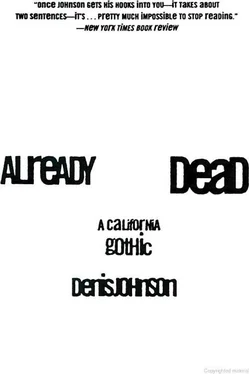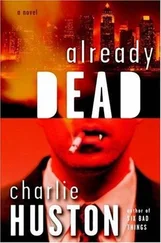How I look forward to visiting their graves.
Each Monday Barron’s financial weekly came in at the Anchor Bay store. I usually delayed till Tuesday, sometimes Wednesday, but in the months since he’d taken to his bed I had never completely avoided picking it up for my father and paying him this horrible regular visit.
I drove over directly from the store that afternoon, Tuesday, September 4, a week after I’d left Winona’s and six days after Winona’s return — the day Carl Van Ness would show us all what he was made of.
We’ll see if our eyes are open . Maybe I believed his note. Maybe I was looking for an alibi for murder. But few folks hereabouts would imagine Nelson Fairchild, Sr., as an alibi for anything.
I’d come from an unhappy interview with Clarence — vaguely unhappy, not violently. Yes, he’d come back to town and found me and I’d told him about Harry Lally’s henchmen. He didn’t thump me — in fact he raised my spirits, but not before making it clear that he hadn’t cultivated the marijuana just to ransom me from my fate, which he called “the just punishment of a fuck-up.” I had a little bit of hope, just a feeling, that he wouldn’t abandon me to those killers. He wanted time to ponder this mess, but he didn’t know how to say, “Let me think.” He was a doer, not a thinker.
Oh well, the day had been a long one, that was all — Melissa resonating strangely, then giving me the horrible news that my pursuers were back on the scene, and after that I’m afraid I told her too much. Also possibly we had Carl Van Ness bumping up on the horizon, and 116 / Denis Johnson
because I thought he might already be in town I’d gone to Winona’s ranch while she was out and — done something; a little thing I’d probably later regret. Could thirty minutes with Father make the day any longer?
The old man lived north of Gualala, on an acre looking out at the Pacific from the highway’s west side. Two stories, three bedrooms, a two-car garage and a workshop, like the home of almost every other sixty-two-year-old person in Mendocino County.
The door from the garage stood open, so I knocked while stepping through it into the kitchen, and Donna Winslow asked me if I would like some tea.
“Thank you, no,” I said, “but what about a glass of wine?” I generally found Donna here in the wifely regions, with her stretch pants and long-sleeved yellow dish gloves and her failure to connect, in certain important ways, with her surroundings. Willful failure.
Cheaper by a long shot than tranquilizers. But it made her seem a little scary, even if her face was pale and kind. Eva Braun might have turned out like that. “We’ve got some open,” she said of the wine, “is that okay?”
“Open’s fine. Poured is better.”
Father had refused to let her move in before the stroke and after that had probably just failed to prevent her. I thought it was fine that she lived here. Particularly I admired her ability to survive without cheap conversation. She never bothered me with that stuff.
I stood there sipping red table wine from a too-small glass while she climbed the stairs to tell him the elder son had turned up with his Barron’s . I don’t just bring it here each week; I also read it to him. It is the strangest thing I do.
I heard Donna’s voice from above. But not his. Maybe he’d snuffed it, and I’d be spared.
His partner, Willis Winslow, had suffered a run of strokes and been laid up for months when my father started sleeping with his wife. The story they tell now is that Father hefted Donna across his shoulders and carried her upstairs to the master bedroom one night right out from under Willis Winslow’s helpless gaze, and had her every night after that while Winslow wasted away in a downstairs room, listening.
Now Father lies in bed as Willis Winslow once did, attended by the same woman. She’s too old, I would imagine, to be cuckolding him.
But I hope she is.
Already Dead / 117
And the same woman he carried up the stairs is coming down now alone.
“He’s kind of dozing, Nelson.”
“Should I disappear?”
“No, he said to come on up. Then he drifted off.”
“I’ll come back later.”
“You could go up and just give him the paper, maybe.”
“Okay,” I said forlornly.
“You want a refill?”
“I’ll take the bottle.”
She’d done a tremendous job on the house, over which formerly his office had run amok, inroaded generously by his shop. She’d pushed everything back, all the tools and ropes and greasy broken automotive parts and fatly unrolling blueprints and escaped and antique correspondence. His rusty file cabinets had disappeared, all but one, the drawers of which she managed to keep closed and the top of which was free of anything but two white daisies in a vase. In his living room she’d put up flowery curtains that matched the Pacific, also hangings of woven rope from Mexico, and, on the walls of the staircase, which I climbed now, but slower and slower, my ankles in a sense shattered, dragging the devices he’d laid years ago to trap his children — let me never reach the top! — she’d nailed up pictures bright as windows.
Don’t ask me why I’m here. Because of a sickly fascination, I guess, but that’s only one of the many feelings that stab at me now as I find him asleep in his small room at the top of the stairs. There he lies, out of it. And I’m as shocked as ever.
He once threatened to kill a man, a perfectly unsuspecting tourist, when he found this stranger sitting in his accustomed chair in the barroom of the Gualala Hotel. He’s famous for having decked a county commissioner at a meeting of the Point Arena town council; also he assaulted the high school basketball coach right on the street when that fine citizen started dating our mother, and although that contest went against my father — he ended up flat on his ass — the coach quit calling, and Mom never had another date in these parts. All night once, with a shotgun across his knees and a two-gallon jug of gasoline beside him on the floor of his bulldozer, he waited quietly in his equipment lot — this a great many years ago now — to surprise whoever had been thieving from his construction supplies. Father did
118 / Denis Johnson
nothing when the man pulled up under the nearby trees in his pickup truck, he sat like stone while the man peeled away the tool-shed’s padlock with a crowbar, waited until he’d gone inside before climbing down from his perch up in the monstrous vehicle. When the bandit tiptoed out of the shed with his arms full of tools, my father paralyzed him with the touch of the shotgun’s barrel to his throat, and soaked him with the gas, all two gallons of it, pouring it down over his head.
“I’ll give you ten seconds’ head start,” he promised the man while producing his Zippo lighter. They both leapt into their pickup trucks, and Nelson Fairchild, Sr., hounded his victim all the way to the outskirts of Ukiah, where the poor burglar took himself, his skin eaten by the gasoline, to the hospital emergency services. Later he sued for thousands. My father would have had to pay him, too, if the man’s lawyers hadn’t bungled it. Father’s never been sneaky when it comes to revenge.
He’s rumored to have had people murdered, but I doubt it. I think he’d have done the killing himself, openly, publicly if possible, and then brazened it out in court surrounded by unbeatable attorneys.
Always the same image arises when I think of him — a face quivering on the border between irony and disgust — so I think of him as always the same. Not till recent months had I ever seen him with his eyes closed.
But he slept a lot these days. There was no irony now in his face, just a bland, pasty innocence ratified by a cowlick. They’d moved in one of those hospital beds that rise and flatten with a button — they’d made a puppet out of him, even if he controlled, to a degree, his own strings.
Читать дальше












